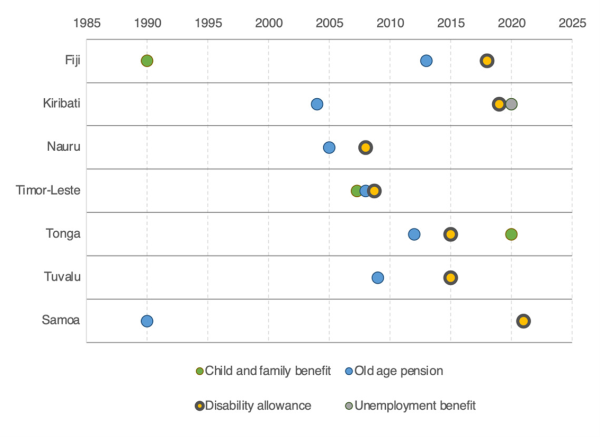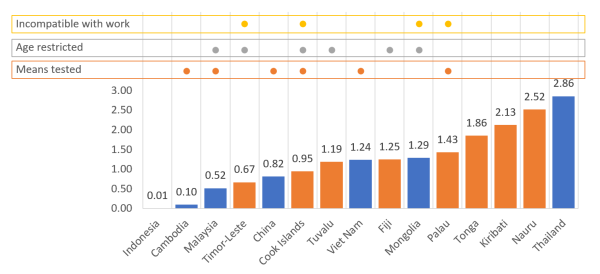Social protection systems currently play a limited role in supporting people with disabilities across much of the globe. While some countries achieve broad social protection coverage for persons with disabilities through a combination of income security benefits and support to address disability-related costs, the coverage and scope of social protection in most countries remain much more limited.
Within the framework of the globally endorsed social protection floor approach, disability is the guarantee with the lowest coverage. Low coverage is strongly linked to eligibility determination, including narrow and inaccessible methods of disability assessment, and the use of means testing. There is also a strong relationship between economic development and the extent of disability-related social protection, with only a small minority of persons with severe disabilities receiving a disability benefit in low- and middle-income countries (19%), compared with high-income countries (86%).
Recent years have seen growing attention paid to how social protection systems can better support the inclusion of persons with disabilities. The United Nations Convention on the Rights of Persons with Disabilities (adopted in 2006) marked a turning point in this respect, by underscoring the importance of social protection systems for supporting the participation of persons with disabilities in society. This has been followed by an extensive and growing body of research and dialogue exploring what this means in practice.
A key insight is that in order to support participation, social protection systems need to address the significant extra costs faced by persons with disabilities. This involves a shift away from the false assumption that disability is equated with incapacity to work, but rather that – with the right support and an inclusive environment – most persons with disabilities would be able to engage in the labour market.
In this context, social protection policy developments in the Pacific are of significant interest. As discussed in a recent report developed by Partnerships for Social Protection (P4SP, an Australian government initiative) the region has seen a wave of countries introducing disability benefits, with seven countries introducing schemes since 2005 (many only very recently) (Figure 1). This has been part of a broader shift towards investments in tax-financed social protection, but also linked to efforts of countries to put into action their ratification of the Convention on the Rights of Persons with Disabilities.
Figure 1: Year of introduction of tax-financed social protection benefits (1985-present), selected countries
 Source: From historical trends to investment pathways: social protection expenditure in Pacific Island countries and Timor-Leste.
Source: From historical trends to investment pathways: social protection expenditure in Pacific Island countries and Timor-Leste.
Many of these social protection schemes have features that are conducive to supporting inclusion of persons with disabilities. Particularly notable is that most schemes are universal, avoiding means testing which is a key driver of exclusion of many persons with disabilities who require support. Most schemes also cover all age groups, including providing supplementary support to older persons. Two schemes (Fiji and Kiribati) are compatible with work, which is conducive to supporting persons with disabilities to participate in the labour market.
These factors mean many Pacific Island countries have relatively high levels of coverage compared to countries in the wider East Asia–Pacific region. New research by UNICEF shows that four of the five countries in the East Asia–Pacific region with the highest disability benefit coverage are in the Pacific (Figure 2). The same research finds that countries in the region also tend to offer more adequate levels of support to individuals relative to regional and global averages.
Figure 2: Recipients of disability benefits as a share of total population (%), compared to key design features, East Asia and Pacific countries
 Source: Charles Knox-Vydmanov, Madeleine Cretney and Jade Siu, ‘Empowering children with disabilities and families through social protection and care in East Asia and the Pacific’, forthcoming report from Development Pathways/UNICEF East Asia and Pacific Regional Office.
Source: Charles Knox-Vydmanov, Madeleine Cretney and Jade Siu, ‘Empowering children with disabilities and families through social protection and care in East Asia and the Pacific’, forthcoming report from Development Pathways/UNICEF East Asia and Pacific Regional Office.
Some countries are also taking steps to move beyond medically driven models of disability assessment. Typically, disability assessments have been based on assessment by medical personnel. In many low- and middle-income countries, access to medical personnel is constrained due to multiple factors including staffing and skills shortages, affordability, and geographical isolation. This is especially true in contexts such as the Pacific Islands. Medically driven assessments of disability also fail to adequately take account of individual support needs, and barriers to participation faced by persons with disabilities.
Some countries – such as Fiji – have been moving towards more accessible mechanisms, which focus on assessing support requirements rather than just impairment. Fiji’s disability assessment process has been developed in close collaboration with organisations of persons with disabilities and is designed to be conducted by a community worker, even in remote islands, with medical assessment required only in certain cases. This has been a critical factor for the rapidly growing coverage of the scheme, which is now reaching 1.25% of the total population after less than 5 years.
Pacific Island countries are making progress towards strengthening their social protection systems to support persons with disabilities – but more needs to be done. While there are promising examples of good practice in countries in the region, disability benefits are relatively new and, in many cases, are not yet enshrined in laws which would ensure sustainability of the schemes.
More also needs to be done to ensure that disability benefits are adequate in terms of payment amount, and are reaching those who need them. Levels of expenditure also remain relatively low compared to OECD countries, and other notable low- and middle-income countries which have made substantial investments in social protection for persons with disabilities (such as Georgia, Mauritius and South Africa).
There is also a need for more comprehensive complementary support for persons with disabilities, including concessions and services to improve health care coverage, provide access to assistive devices and personal assistance, and to reduce the reliance on unpaid care provided by families, especially women and girls. There are some signs of promising developments in this respect, such as the roll out of transport subsidies in Fiji, and efforts to pilot models of home-based support in Tonga. Along with adequate budgets, a strong focus on monitoring, evaluation and learning, including through engagement with the disability community, will ultimately support better social protection outcomes for persons with disabilities.
Disclosure
The authors’ analysis is drawn from research conducted by UNICEF and a suite of work being undertaken by P4SP as an initiative of the Australian government to advance social protection in the region. The views expressed are those of the authors and do not represent the views of the Australian government.











